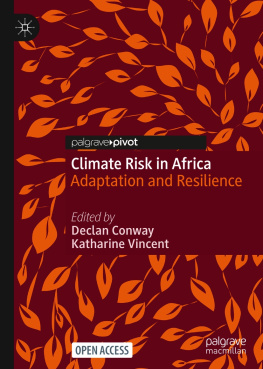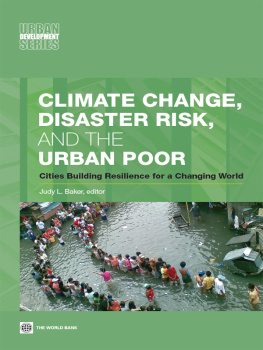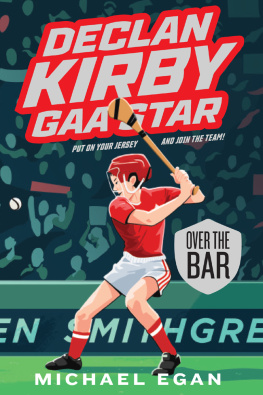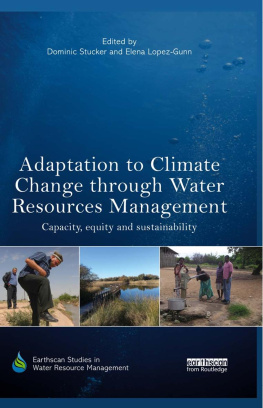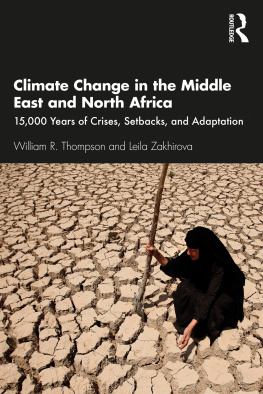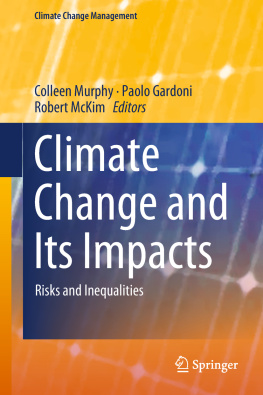Declan Conway - Climate Risk in Africa Adaptation and Resilience
Here you can read online Declan Conway - Climate Risk in Africa Adaptation and Resilience full text of the book (entire story) in english for free. Download pdf and epub, get meaning, cover and reviews about this ebook. year: 2021, publisher: Springer International Publishing, genre: Home and family. Description of the work, (preface) as well as reviews are available. Best literature library LitArk.com created for fans of good reading and offers a wide selection of genres:
Romance novel
Science fiction
Adventure
Detective
Science
History
Home and family
Prose
Art
Politics
Computer
Non-fiction
Religion
Business
Children
Humor
Choose a favorite category and find really read worthwhile books. Enjoy immersion in the world of imagination, feel the emotions of the characters or learn something new for yourself, make an fascinating discovery.
- Book:Climate Risk in Africa Adaptation and Resilience
- Author:
- Publisher:Springer International Publishing
- Genre:
- Year:2021
- Rating:3 / 5
- Favourites:Add to favourites
- Your mark:
- 60
- 1
- 2
- 3
- 4
- 5
Climate Risk in Africa Adaptation and Resilience: summary, description and annotation
We offer to read an annotation, description, summary or preface (depends on what the author of the book "Climate Risk in Africa Adaptation and Resilience" wrote himself). If you haven't found the necessary information about the book — write in the comments, we will try to find it.
Climate Risk in Africa Adaptation and Resilience — read online for free the complete book (whole text) full work
Below is the text of the book, divided by pages. System saving the place of the last page read, allows you to conveniently read the book "Climate Risk in Africa Adaptation and Resilience" online for free, without having to search again every time where you left off. Put a bookmark, and you can go to the page where you finished reading at any time.
Font size:
Interval:
Bookmark:
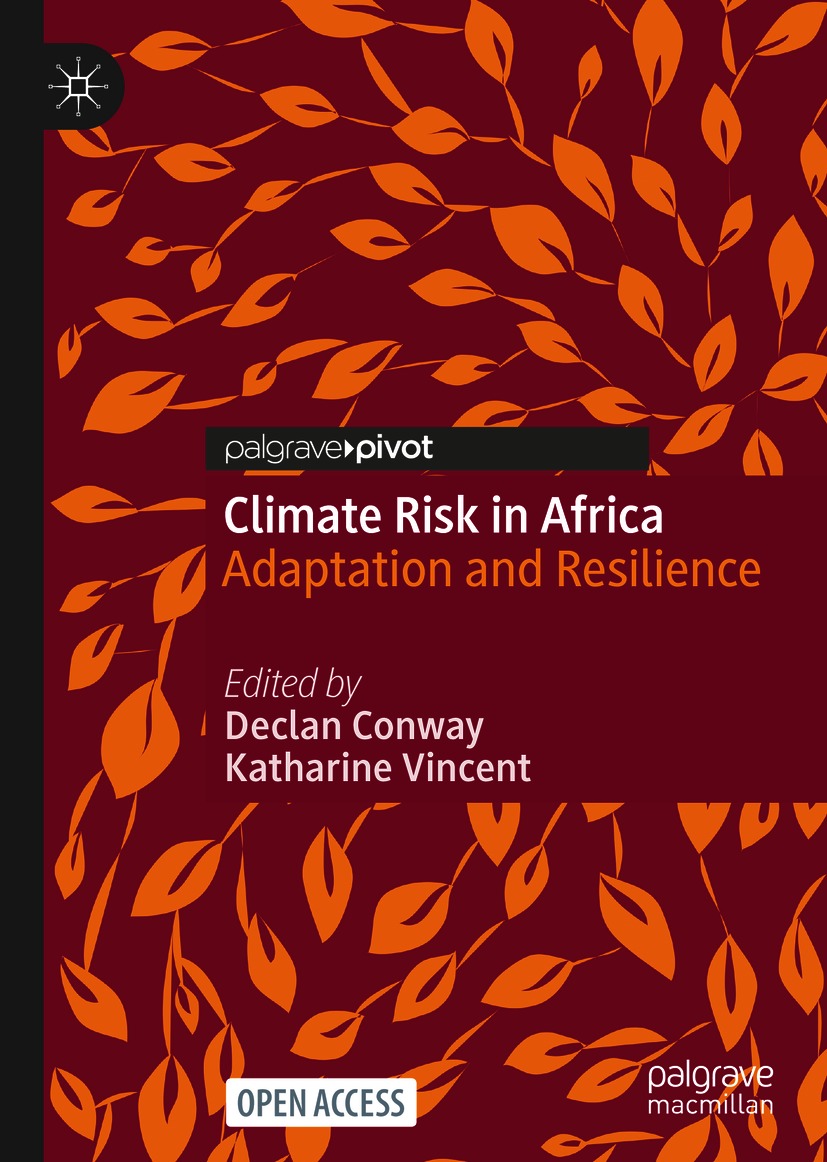


Open Access This book is licensed under the terms of the Creative Commons Attribution 4.0 International License ( http://creativecommons.org/licenses/by/4.0/ ), which permits use, sharing, adaptation, distribution and reproduction in any medium or format, as long as you give appropriate credit to the original author(s) and the source, provide a link to the Creative Commons license and indicate if changes were made.
The images or other third party material in this book are included in the book's Creative Commons license, unless indicated otherwise in a credit line to the material. If material is not included in the book's Creative Commons license and your intended use is not permitted by statutory regulation or exceeds the permitted use, you will need to obtain permission directly from the copyright holder.
Cover pattern Melisa Hasan
This Palgrave Macmillan imprint is published by the registered company Springer Nature Switzerland AG.
The registered company address is: Gewerbestrasse 11, 6330 Cham, Switzerland
As African scholars, we have a critical role to play in climate adaptation and resilience in Africa. Trained in environmental science, civil engineering (water) and climatology, our involvement in the Future Climate for Africa (FCFA) programme gave us the opportunities to broaden our skills, to question and to learn and network as part of multidisciplinary teamsessential for addressing the challenges posed by climate change. Critically, we were also able to focus on solutions and actions, recognising that the process of arriving at solutions is more robust when it is inclusive and based on dialogue.
This book is published at a time when record-breaking weather events related to global temperature trends and rainfall extremes in various regions are on the rise. The decade 20102019 was the hottest on record, with 2019 as the second hottest year on record. The impacts of climate change and weather extremes have adversely affected livelihoods, fragile ecosystems , landscapes and vulnerable communities in Africa, and these trends are likely to continue.
Climate Risk in Africa: Adaptation and Resilience brings to life the opportunities for promoting development that is resilient, inclusive and sustainable in the African context. Chapters variously address the distillation of climate information, co-production of decision-relevant knowledge , and approaches trialled under FCFA to support improved use of climate information in planning and decisions that enable resilience and adaptation.
We congratulate the editors, Declan Conway and Katharine Vincent, and all the authors for their initiative to capture the stories that set Africa apart, and for making a collection of expertise and experiences available that is going to be pivotal for all ongoing work across the continent and beyond.
The content is relevant for a wide audience. We encourage other researchers to read this book as it gives insights for Africas climate risks, mitigation and adaptation measures that the continent requires us to act upon. For climate scientists, this book gives innovative distillation of climate risks and guidance on interactions with users to increase usefulness and usability. Policymakers and decision-makers will have to take climate risks into account and adapt to climate impacts if humanitarian and development goals are to be realised and sustained. For them, this book provides decision contexts and the climate information required to contribute to climate-resilient development, including under the United Nations Framework Convention on Climate Change ( UNFCCC ) process, as many countries commence the process of revising their Nationally Determined Contributions.
In the coming years, it is our hope that Africa will emerge at the forefront of the transformation of how we approach adaptation and resilience to climate change. We are all committed to being part of that process and, building on some of the approaches presented here, we invite you to join us.
Kornelia Ndapewa Iipinge (FRACTAL embedded researcher, now SADC Centre for Renewable Energy and Energy Efficiency), Rebecca Ilunga (FRACTAL researcher, now Civil Engineer, ZUTARI) and Geoffrey Sabiiti (AMMA-2050 researcher, Climate Change Adaptation Officer, Intergovernmental Authority on Development Climate Prediction and Applications Centre)
Much of the research reported in this book arises from the Future Climate for Africa (FCFA) programme with funding provided by the UK Department for International Development (DFID) (now Foreign and Commonwealth Development Office, FCDO) andthe UK Natural Environment Research Council (NERC).
The FCFA website contains full information about this major research programme; its people, projects and outputs https://futureclimateafrica.org/
FCFA was implemented by five consortia and a Coordination, Capacity and Knowledge Exchange Unit. We gratefully acknowledge the support, interactions and effort of the huge number of people involved in the whole programme.
We thank the following for providing very helpful and timely reviews of the chapters: Meaghan Daly, Joe Daron, David Dodman, Denyse Dookie, Stephanie Gleixner, Blane Harvey, Christian Henschel, Laura Husak, Holger Hoff, Lindsey Jones, Yobu Kachiwanda, Matt Kandel, Hayley Leck, Virginie Le Masson, Claudia Meintzinger, Fiona Nunan, Emanuela Paoletti, Fiona Percy, Jamie Pittock, Dave Rowell, Dave Stainforth, Cathy Vaughan, Coleen Vogel, Calistus Wachana, Neil Ward and Lena Weingrtner.
Funding acknowledgements. UK NERC Grant Numbers: Chapter : NE/M020398/1 (UMFULA, LSE), NE/M020010/1 (UMFULA, Kulima).
Font size:
Interval:
Bookmark:
Similar books «Climate Risk in Africa Adaptation and Resilience»
Look at similar books to Climate Risk in Africa Adaptation and Resilience. We have selected literature similar in name and meaning in the hope of providing readers with more options to find new, interesting, not yet read works.
Discussion, reviews of the book Climate Risk in Africa Adaptation and Resilience and just readers' own opinions. Leave your comments, write what you think about the work, its meaning or the main characters. Specify what exactly you liked and what you didn't like, and why you think so.

